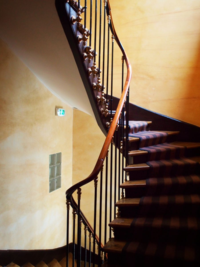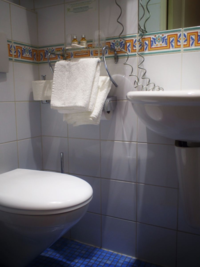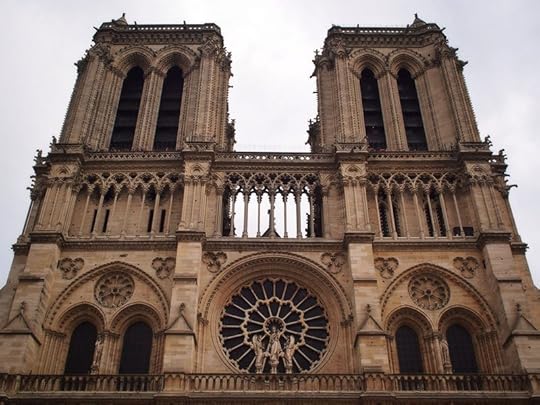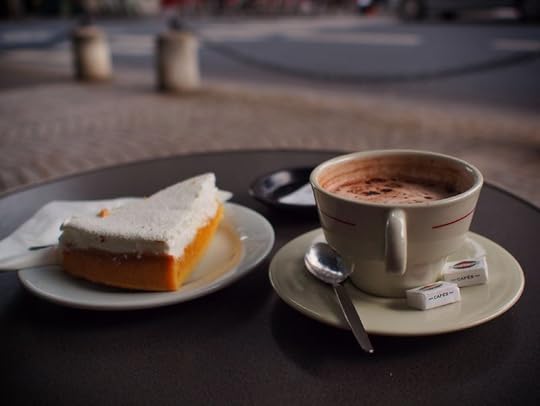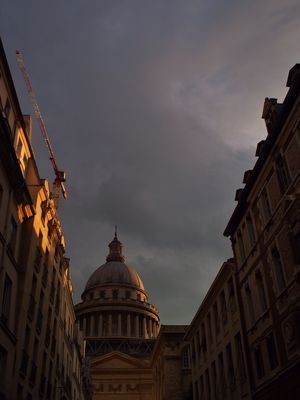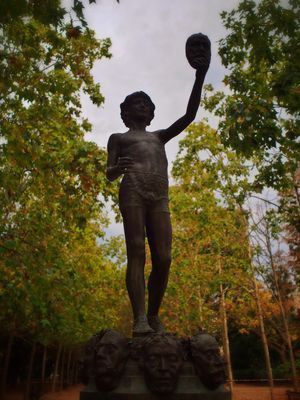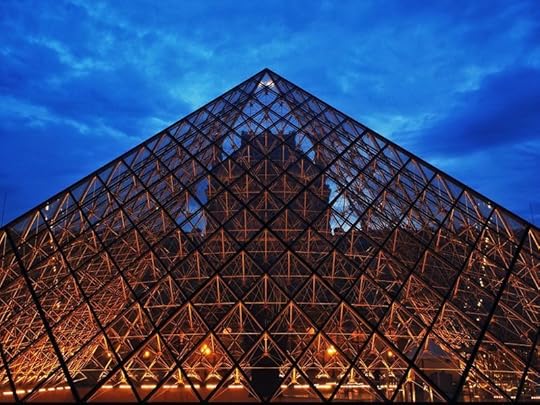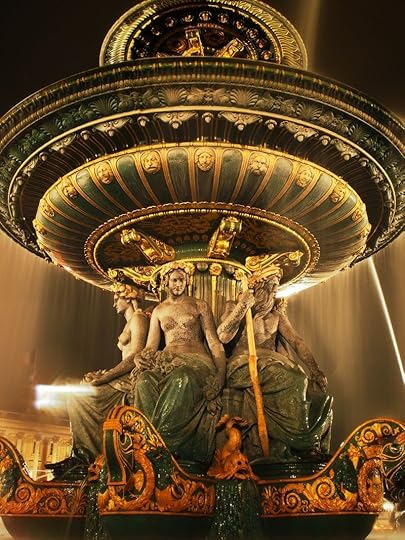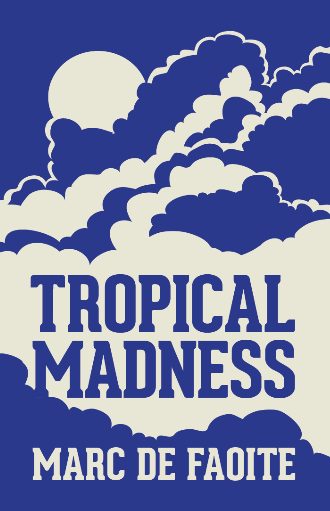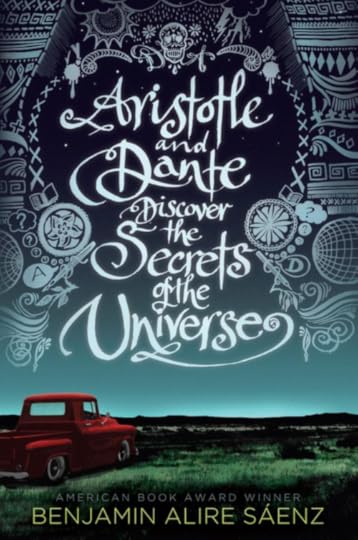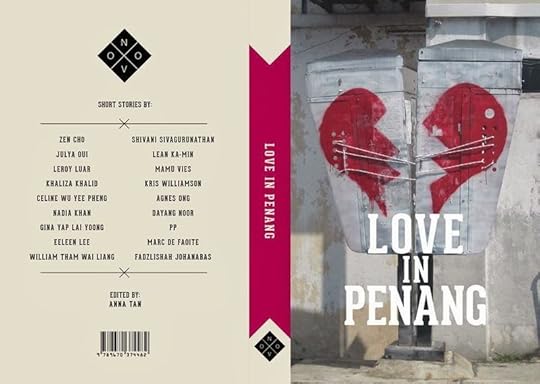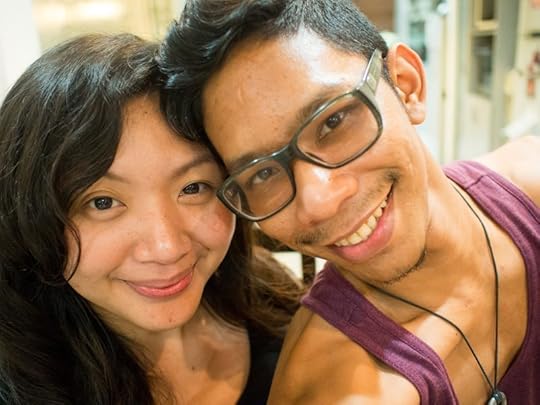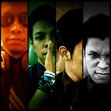Fadzlishah Johanabas's Blog, page 4
March 21, 2014
May angels keep them safe, no matter where they are
"Ladies and gentlemen, boys and girls. This is your captain speaking."
The plane cruises over the South China Sea. The endless expanses of sky and sea are of the exact same shade of brilliant blue, and the clouds, patches of sun-kissed cotton candy, greet the rising sun as if they were a congregation of angels. And maybe they are. These clouds. Maybe they are angels watching over the land, and this is how we perceive their existence.
"This is your captain speaking."
How often do I hear this, without really paying attention? I never register the names of the flight crew, not even the good-looking ones as they make their rounds along the aisle, serving food and beverages and making sure the flight is as comfortable as possible for everyone on-board.
I'm sitting beside the window, the kind of seat I'm always willing to pay extra for whenever I book a flight ticket. I'm watching the sky and the sea and the sun-kissed clouds. Earlier I requested for a pillow for the little girl sitting beside me. I don't engage in small talk with her or her mother. Or maybe her grandmother, who has aged gracefully. I don't even ask for their names, though they remind me of my mother and my niece, those two who share an inseparable bond only unquestioning love can forge. In front of me, a man is snapping pictures of his teenage son. He's holding his dSLR wrong. He's even using the built-in flash. Amateur.
The plane sings a constant hum, though I'm sure outside it's roaring in defiance. A human-made bird of metal dares to take flight, to traverse across mountains and oceans to reach lands half a world away in a matter of hours.
"This is your captain speaking."
It's almost two weeks since the disappearance of flight MH370, bound from Kuala Lumpur to Beijing. In the almost-two-weeks, the entire nation has moved from shocked disbelief to rallying people to pray for the safety of the 239 people on-board to craking jokes about our efforts to search for the plane that include employing shamans, and officials who appear to hide more than they are willing to share, and to conspiracy theories cropping up faster than malignant cancer cells do.
A baby is crying somewhere in front of me, and I can see heads turning, discomfited by the noise. I can only imagine the parents cycling between trying to calm the baby and stealing apologetic glances at other passengers. I have my noise-canceling headphones on, so the cries are muted. I may not come across the child again, or the parents, or the other passengers, or even the flight crew.
After the initial flurry of show of solidarity and prayers offered to God (and other deities) via Facebook status updates and Twitter and hashtags, things have noticeably slowed down. In my head, an army of angels are sitting in front of rows upon rows of computer screens, taking down all the typed prayers. Maybe the hashtags make things easier for them to monitor those prayers. Things sure have changed since the days of prayers whispered in the reverent hush of mosques and churches and temples.
The hashtags may have slowed down, but the conspiracy theories are only picking up steam. So are the jokes and parodies. And bomoh mobile apps. In a little less than two weeks, it is evident that the rest of the world is moving on. Their own lives are more interesting. It's back to hashtags like #foodporn and #selfie and #holiday. Maybe more than half the angels assigned to monitoring the internet are reassigned back to their original tasks.
A woman accompanying her son to the toilet stops to chat with another woman sitting behind me. They know each other. They exchange names of mutual friends, and promise to catch up back home. Or something like that. I don't really care. I'm writing this.
First the speculations revolved around the two passengers using stolen passports. Then it was hijacking by people of countries much more powerful than ours. Now it's the pilot who's under scrutiny. For some reason, his unyielding support toward a politician is emphasized. Maybe it's because his support is for a prominent opposing party, and not the ruling one. And his home-built flight simulation, first mentioned to show how dedicated he is to his work, now an object of further speculation, what with the wiped-out data.
I don't really pay attention to speculations and newspaper articles. In my head, I visualize a plane bigger than the one I'm in, with over 200 passengers on-board, flying over a pitch-black ocean, under an even darker sky but with silent starlight forming constellations. Maybe one of the passengers were looking out the window, figuring out the configurations of starlight that looked familiar but somehow different than those seen from outside the window of his or her home. I imagine a colicky baby crying, inconsolable, and the parents darting apologetic glances to everyone around them. Or maybe both the babies in the plane were sleeping in their parent's arms when all communications from the plane stopped.
I can only imagine, based on fiction and movies about airplane disasters, what went on when the blip of the flight disappeared from radars. I can only imagine the abject terror that gripped those on-board, the frantic prayers and the regrets and the anger and the love and the resignation. I don't know any of the passengers or flight crew. I don't eve know their names. I can only imagine the fear that overrode everything else. The absolute certainty that you are about to meet the Maker, but you don't want to. Not now. Not yet. I've lived through that same fear, though for me, I was ready to let go of everything.
I can only imagine. I can only speculate.
Perhaps I am no better than the conspiracy theorists and opportunists, after all.
We may have moved on, and the hashtags may have changed back to normal, but the lives of the families of the missing persons are forever changed. They are still holding on to that frail hope that gets ever smaller with each passing day. I can only imagine how hard it is for them, the fear of not knowing the fate of the missing people.
Missing people.
That's what we're forgetting. In the comfort of our offices and homes and restaurants, we speculate and crack jokes about how backwater our country is in handling this crisis. We share photos of parodies of bomohs (who were actually doing something, though using highly questionable practices) and apps that make light of the situation. We chat about corrupt politicians and conspiracy theories. We conveniently forget about the 239 people on-board that flight, because we don't know them at a personal level. Their lives don't really matter to us because despite the crisis, our lives are not affected. We can still Instagram delicious-looking food in restaurants and tag #foodporn and wait for strangers to click 'Like'.
When a crisis occurs, our first instinct is to find something or someone to blame. Let's face it. It terrifies us when something bad occurs and we cannot explain it. It means that the same can happen to us and that life is beyond our control and comprehension. It means that life is much larger than you and me and we have no say about it. Hence, the urge to villify someone. If the passport thiefs were terrorists, then it makes sense. If the pilot deliberately hijacked the plane, then it makes sense. If there was a technical error depriving everyone of oxygen at such a high altitude then it makes sense.
In order to make sense, in order to feel that much safer when we book a flight ticket, we come up with all these theories. We start scrutinizing everyone, from the flight company to every passenger. Compassion turns to morbid interest. We deconstruct people and make them less human. Even a pilot's political affiliation comes into question. Even a co-pilot's social activities become his undoing.
"Ladies and gentlemen, this is your captain speaking."
How many times do we hear this and feel reassured by it? How many times do we trust our lives in that stranger in a sharp uniform and a distinct cap? How many times do we trust our lives in that gargantuan metal construct that seems impossible to take flight just by looking at it?
Our lives may have moved on, but for the families of the people on-board MH370, life is at a standstill. So please, find it in your heart to respect that, to respect them, and may we offer silent prayers in our own hallowed spaces even though the hashtags have slowed down to a trickle.
May angels keep them safe, no matter where they are.
May angels lead them home, no matter where that home is.
Al-Fatihah.
March 2, 2014
Book Review: Nazi Goreng Marco Ferrarese
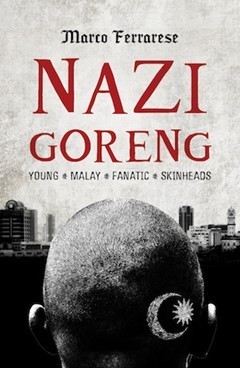
If there is one word to describe this book, unapologetic would be it.
Nazi Goreng by Marco Ferrarese is about a young Malay man, Asrul, who goes through a traumatic experience in the hands of a group of Indian thugs, and is then taken under the wings of one charismatic Malik, who is several years older than Asrul. I don't normally emphasize on race, but race is everything in this book. Everything. You see, Malik is a Malay supremacist skinhead who sees other races as impure, corrupt, a cancer that gnaws on the sovereignty of Malaysia. Much like White supremacist skinheads in the US or UK.
I kid you not.
This duo then escapes backwater Alor Star for better opportunities in Penang, and get involved with drug traffickers. Much like White supremacist skinheads from Lima, Ohio, who get involved with Mexican drug cartels. Why do I keep comparing the protagonists with White skinheads? Because, essentially, if you transplant these Malaysian characters and settings into an American one, you'll get the makings of an American novel/movie.
So is the book inherently Malaysian, you ask? I've been implied to take into consideration an author's Whiteness in writing a Malaysian book. In truth, I don't really care who the writer is; to me, the writing is everything. I got irked when author Marc DeFaoite kept using "Kay El" regardless the narrator is Bangladeshi, Indonesian, Nepalese, Malay, Indian, or whatever nationality that is not Western. In this book, Mr Ferrarese injects Italian sensibilities in a protagonist that has never been out of Alor Star. He compares characters and objects with Venus, Cyclops and Jesus. The main character, Asrul, is a practicing Muslim, by the way, though 'practicing' is a strong word for what he does.
But oh. My. God. Mr Ferrarese is one hell of a compelling writer. I finished the book in less than a day. The opening chapters are beautifully written, with exquisite imagery and characterization. Despite what I will say in the following paragraphs, reading this book makes me feel that the culture of skinhead Malay supremacists is pervasive throughout peninsular Malaysia, and that they represent an actual cancer that gnaws at the fragile equilibrium that is Malaysia. Reading this book makes me believe that the threat is real, and racism in Malaysia has deeper roots than I'm willing to admit. And that, to me, makes for a successful novel.
Nazi Goreng, in the introductory chapters, holds so much promise, so much potential. It has the makings of something great. Killer opener? Check. Excellent writing that feels real? Check. High concept? Skinhead racists plus Iranian cartels plus trigger-happy Africans plus multiple locations in Malaysia (and one in Taipei). Check. Page-turning thriller with danger at every corner? Check. Stakes that grow bigger and bigger? Check. A likeable protagonist? Check.
So what went wrong?
When Asrul and Malik get involved with the Iranian drug lord and aspire to do more than just trafficking drug at the Malaysian/Thai border, Asrul's life careens out of control. Unfortunately, so does the book. It's like the author introduces too many action/thriller elements and doesn't know what to do with them. Good news is, he tries to tie these elements together at the end of the novel. Bad news is, he loses interest in the main characters and is more invested in the stolen money instead. More on the ending later.
In the middle of the book, the author breaks off from the main characters and writes a few chapters on a group of four immigrants, Ngoc, Nyan, Cam and Than. I know, right? Not only are the names too close and confusing, introducing new named characters that are not essential in the middle of a book is not a good idea. Sure, Mr Ferrarese is smart enough to use these characters later in the book to move it, but if his intention to spend two chapters on their backgrounds and wants and needs to humanize them, to build sympathy toward marginalized immigrants, I say he's not done enough. In the end, these chapters and characters become mere fluff to thicken the novel, fluff that distracts a reader's attention, risking losing that attention altogether. Even if the author did not employ these characters' perspectives, did not even name them, he could still use them later on to move the story as he needed. This bit of fluff has earned the author some negative marking.
So Mr Ferrerese throws in Iranian drug lords, African rival cartels, sleazy bartenders, one hot Chinese national drug mule, and one not-so-hot Indonesian maid, with high-speed chase and machine guns, kapows and ratatatats that lead to torture and murder, all in the name of stolen money with a grand total of…drumroll please…
RM40,000.
That's USD 12,182.12, according to Google.
Even a terrace house in the outskirts of Kuala Lumpur costs over a million ringgit. Heck, give me forty-thousand ringgits and half a day at Pavilion, and I'll ask if you have another forty-thousand to spare at the end of three hours. Maybe two, depending on which stores I visit first.
The first job Asrul and Malik secure, transporting drugs in a car tire without them realizing it, earns them RM8,000. Have them do five jobs, they'll get the same amount of money. So all these murder and mayhem in the name of RM 40,000…. What I'm saying is that the stakes are not high enough. Not nearly enough. Too low, in fact. If it were USD 40,000 (which Google converts to RM 131,340.03), then it would have been something at least. Still not high enough, but much higher than what the author uses.
Also, Malik keeps mentioning he has connections in high places. At first Asrul thinks it's his connections with police officers who believe in Kuasa Melayu (Malay Power) as much as Malik does, but that's not it. When Malik does reveal who he actually is…OH COME ON! THAT'S IT?! Speaking of, I would have appreciated more insight on what makes Malik tick. He's a sociopath, that's clear, but why is he such an angry racist in the first place? With Asrul, it's pretty clear. Take a traumatic experience and a highly impressionable young man in his late teens, you get Asrul. Malik, however…. I think it's a lost opportunity with him. Would have made for a mighty interesting story.
Now. Coming to the ending.
I fell asleep at the supposed climax.
Like I mentioned before, when the ending comes, it's no longer about Asrul and Malik's journey, but about the missing money. It doesn't really matter what becomes of them; the protagonists are relegated into secondary characters. Worse, the greatest sin of all, the author ends the novel with exposition after exposition. It's like reading Naruto, where you're getting to the climatic fight (for that chapter in Naruto's life), and then you see the inevitable black background and you're forced to read ANOTHER back story. For an action thriller novel, writing a climax using exposition is not only anti-climactic, it's buzzkill. It's robbing a reader of a much-needed release. It causes blue balls.
Blue balls are NEVER good.
I don't think the author's entirely at fault here. It was pretty clear that he lost control of the story when Asrul lost control of his life. Mr Ferrarese did not self-publish this book, so an editor is involved. An invested editor takes the rein when the author loses control. Or supposed to, anyway. I wasn't lying when I said the beginning is brilliant and the writing is engaging. They are. Mr Ferrarese has the mark of a good writer. What he needed for Nazi Goreng was a team of good editors, editors who, without compromising his stylistic and artistic integrity, guide the story back to its intended path, to smoothen out kinks like Italian mythology in Malay characters, derogatory descriptions of a Muslim praying (he uses "kisses the floor" throughout the book to describe praying), to correct his consistently wrong usage of colons, all that jazz. And he needed a good proofreader (or two) to spot and correct the horrendous amount of typos, missed spaces, wrong punctuations.
In essence, Mr Ferrarese was sold short with Nazi Goreng, and what could have been a brilliant novel is merely a book of good writing, unrealized potentials, and a non-existent climax. What we have here is a book that causes blue balls.
When I started reading the book, despite what my friend said, I wanted to give it a 4.5 to 5 star rating. When the story went out of control, I wanted to give the book a 3.5 star rating, rounded up. With the ending taken into consideration, I'll only give it 3.5 stars, rounded down.
The author holds so much promise, and the book so much potential. It's unfortunate, really. I hope, if Mr Ferrarese writes another novel, he is fortunate enough to invest in invested editors.
February 24, 2014
Paris Dreamed of Me
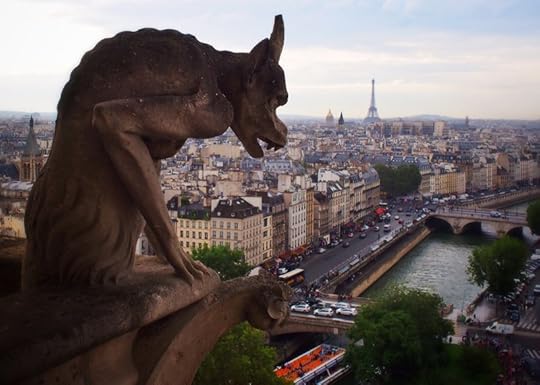
This post is long overdue, I know. I can say that I wanted enough space between the trip and writing this to have a precise, objective view. I can also say that the experience was so magical, so personal, that putting it down in writing would smear the memory.
Truth is, as with everything else, I've been procrastinating. It's the one thing that I do with any passion at all.
However, it has come to mind that the longer I wait, the less vivid I can recall the sloping streets of Latin Quarter, or the stillness of chapel grounds despite the heavy traffic just outside the gates, or the cool autumn breeze atop Notre-Dame that carried with it the warm scent of freshly-baked pastries. So I write this now, for good or for ill, for better or for worse.
I write this now, in hopes that I will continue dreaming of Paris, city of artisans and dreamers, city of love eternal.
I had always dreamed of visiting Paris at one point in my life. It was high in my bucket list; if I were to travel anywhere, especially to Europe, Paris was always the first name that came to mind. Maybe it was because of the movies that featured this city of amazing architecture and art, maybe it was because the Paris I read in books like The Da Vinci Code by Dan Brown, Anna and the French Kiss by Stephanie Perkins and Just One Day by Gayle Forman. Maybe it's the language itself, perfect to be whispered just behind the earlobe, and perfect to be shouted from across the street. Maybe it was all of the above. For a helpless romantic like me, Paris was the perfect place to be.
My trip there, to be honest, was only a tentative plan. Had I cemented the decision earlier, I would have arranged to fly back home from Paris instead of Frankfurt, and I would have gained another full day there. As things turned out, I extended my stay in Europe for two days—I still owe Kasha RM150 for the ticket change. I used the ICE trains between Frankfurt and Paris, which took about four hours and 140E one way. Unfortunately, it was also a long weekend for the Germans celebrating the union of East and West Germany, so a lot of Germans decided to visit Paris the same dates I went there. Needless to say, tickets were limited and freaking expensive.
The trip itself was excellent. First class, with croissants and hot chocolate (I did mention expensive, didn't I?). Outside, I saw sloping hills of green fields and quaint villages with steep roofs and smoking chimneys as the train speed along its track at three-hundred-and-thirty kilometers an hour. There were no mountains, and there certainly was no snow.
Bummer.
In the four hours, I edited the photos I took in Germany—those I hadn't edited yet, of course—and before long, the city came into view. At first there were only railway stations and graffiti-adorned walls, and everything looked drab. Definitely not the Paris in my mind. Then the train stopped, and I disembarked, and—
"PARIS, I AM IN YOU!" I yelled (in my heart).
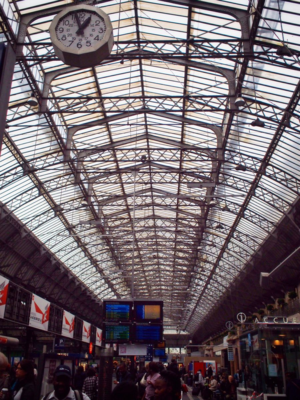 Well, to be honest, there were plenty of very tall, very blonde people all around me, all conversing in German. Not the gentle, rolling language of romance, but the clipped, wintry language of conquerors. Fine, if you want to get technical, Napoleon Bonaparte was the conquering French emperor, and he certainly used French as a military language. Bear with me for a minute here.
Well, to be honest, there were plenty of very tall, very blonde people all around me, all conversing in German. Not the gentle, rolling language of romance, but the clipped, wintry language of conquerors. Fine, if you want to get technical, Napoleon Bonaparte was the conquering French emperor, and he certainly used French as a military language. Bear with me for a minute here.
Anyway. There were plenty of Germans to make me feel like I was still in Frankfurt, but looking at the signboards, there was no doubt where I was. Even the station I was at, Gare de l'Est, sounded so French! Oh la la!
Ehem.
Since everything was so French and I was so over my head, I headed straight for the tourist information center. Best. Decision. Ever. There was a line, but it was okay. I snapped a picture of the mailbox because it was yellow, not like the red ones in Malaysia. Ours are red, right? The guys behind the counter were friendly and helpful, and they advised me to get a five-day Metro ticket that could be used for the trains and buses, and a four-day museum pass. The two passes cost me 54E. Or was it 75E? Can't exactly remember, and Evernote ate my expenses list. The info counter guys offered me a Disneyland Paris pass, but I wasn't about to visit Disneyland without my family. No, sir. They also supplied me with a Metro map, and showed me which train to take, and which station to disembark at.
Of course I took the wrong train.
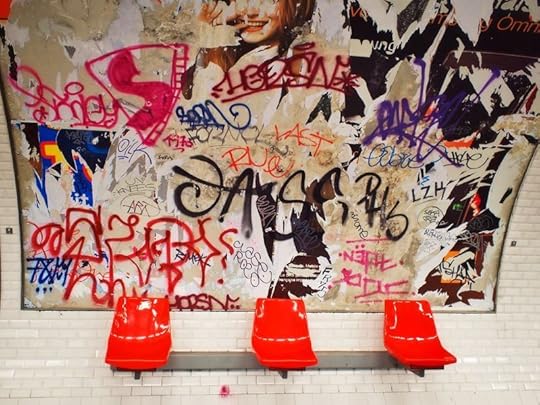
Technically, they gave me the wrong direction, and I still have proof of it. The guy whose English was decorated with French connotations marked the station Jussieu, so I took the number 5 (orange). But as I stood in the train, doing my best not to ogle at pretty French people—both the women and men were more than pleasant to look at, these French—I checked my hotel reservation email, and it said the hotel was near Notre-Dame, and where I was going, the cathedral was nowhere near. Well, on the map it looked near, but hey. I called up the hotel and they instructed me to take the number 4 (purple) to St-Michel. So I went back to Gare de l'Est and took the number 4 to St-Michel as instructed. In retrospect, I could have just taken the number 10 (mustard) to Cluny-La Sorbonne and then walked along the tunnels to St-Michel. Yes, French people, I KNOW, RIGHT?! Such a tourist.
Once I disembarked at St-Michel, lugging along my freaking heavy bags (yes. Plural), clunking each step of the endless staircases, I got a little intimidated by all the people rushing about. It was something like the LRT stations in KL, and people didn't wait for others to disembark before going in (unlike in Germany, where people actually waited out of the way), but the people there were generally bigger. And had way more fashion sense. Then, out of the underground station and into—
PARIS!
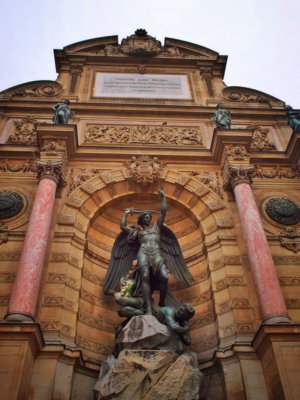 Rue St-Michel was as French as it would ever get in my head. Even the air was different, supercharged with this lively energy. People were everywhere: sitting outside cafes facing the street, gathering around fire-eaters in front of the statue of St-Michel, walking along the riverbanks lined by stalls that sold artworks, entering and exiting shop lots and boutiques. I was breathless, but I breathed deep regardless. The air was damp from the rain that had just settled, with an undercurrent of pigeon dropping, but over this was the scents of baked goods. Also, I noticed that it was much warmer than Germany. By warm, I meant twenty Celsius, which was cold by my native standard. However, having acclimated to the cold German air, I felt warm enough in Paris to take off my jacket and walk around in my short-sleeved T-shirt and jeans. The beanie and neck scarf I bought in Mainz were just a fashion statement. Ehem. My stomach was grumbling already, but I needed to store my bags first. I booked a room at Hotel Europe Saint Severin through http://www.agoda.com for the price of USD240 per night. Again, in retrospect, I could have saved on hotel, but I wanted someplace safe for me to leave my things for extended periods. The hotel was tricky to look for, but the staff were friendly and accommodating, and there was this big fat cat who had his own chair in the lobby. Plus, the hotel offered free WiFi. Schwing!
Rue St-Michel was as French as it would ever get in my head. Even the air was different, supercharged with this lively energy. People were everywhere: sitting outside cafes facing the street, gathering around fire-eaters in front of the statue of St-Michel, walking along the riverbanks lined by stalls that sold artworks, entering and exiting shop lots and boutiques. I was breathless, but I breathed deep regardless. The air was damp from the rain that had just settled, with an undercurrent of pigeon dropping, but over this was the scents of baked goods. Also, I noticed that it was much warmer than Germany. By warm, I meant twenty Celsius, which was cold by my native standard. However, having acclimated to the cold German air, I felt warm enough in Paris to take off my jacket and walk around in my short-sleeved T-shirt and jeans. The beanie and neck scarf I bought in Mainz were just a fashion statement. Ehem. My stomach was grumbling already, but I needed to store my bags first. I booked a room at Hotel Europe Saint Severin through http://www.agoda.com for the price of USD240 per night. Again, in retrospect, I could have saved on hotel, but I wanted someplace safe for me to leave my things for extended periods. The hotel was tricky to look for, but the staff were friendly and accommodating, and there was this big fat cat who had his own chair in the lobby. Plus, the hotel offered free WiFi. Schwing!
The room was small but quaint, and the bed was oh-so-comfortable that I could just lie down and….
No way.
I immediately got up, took out my camera and map, and made sure I had my Metro ticket and museum pass in my wallet. I was ready to walk about. The receptionist recommended me to visit Notre-Dame, which was within walking distance.
"Merci beaucoup!" I say with a smile. So French! Full disclosure: I almost said danke schoen.
I stopped in at St-Michel square to snap pictures of the statue. I would come to know in the days that followed that statues like this adorned the city. Works of art were not restricted in museums or special spots, but everywhere. Then I crossed the busy street and walked along the riverbank. Oil paintings, retro posters, noir artworks and of course, touristy souvenirs were displayed at the stalls. I wanted to get something for my family, but decided to take my time to look for something meaningful and not just touristy. And Notre-Dame, tall and imposing on its own island, got ever bigger as I approached it. Even from a distance I could appreciate the intricate details of the carvings and statues populating the cathedral. There was a long line to get into the cathedral, but I was not about to spend the evening lining up. Or so I thought.
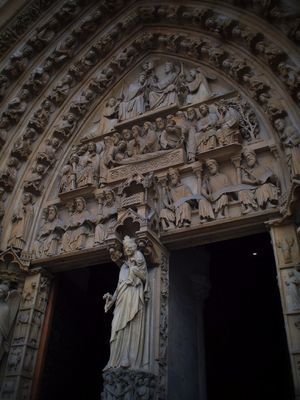 After snapping pictures of the arched doors, which, I came to know, were carved to depict the Bible for commoners who were illiterate back then. When I walked to the side, intrigued by the scents of cinnamon and vanilla and chocolate coming from bakeries beside Notre-Dame, I spotted a shorter line along the side of the cathedral. It was for the top-level walkways where the gargoyles were. So I lined up, which ate up fifteen, twenty minutes. I showed my museum pass when it was my turn to walk up, and the unsmiling guy waved me in. We tourists walked in one file up the narrow staircase and into a very modern shop, another tourist trap. I browsed around, eyeing possible purchases, but then I just headed for the real goods: the view from above.
After snapping pictures of the arched doors, which, I came to know, were carved to depict the Bible for commoners who were illiterate back then. When I walked to the side, intrigued by the scents of cinnamon and vanilla and chocolate coming from bakeries beside Notre-Dame, I spotted a shorter line along the side of the cathedral. It was for the top-level walkways where the gargoyles were. So I lined up, which ate up fifteen, twenty minutes. I showed my museum pass when it was my turn to walk up, and the unsmiling guy waved me in. We tourists walked in one file up the narrow staircase and into a very modern shop, another tourist trap. I browsed around, eyeing possible purchases, but then I just headed for the real goods: the view from above.
The spiral staircase were narrow and lit by slit windows that I imagined were for archers in medieval times. The rock walls were cool to the touch, and I could feel their age. I wondered what stories the walls were willing to share, and I imagined monks shuffling in their habit up and down the staircases, silent and devoted. I imagined the hunchback slinking in the shadows, looking out the windows where the world that could not accept his deformity went about without him. I imagined generations of builders and artisans working toward building one of the grandest, most intricate architectural wonders of an age long gone. Notre-Dame was celebrating its eight-hundred-and-fiftieth birthday when I visited Paris. Nearly a thousand years in existence, and it still stood strong.
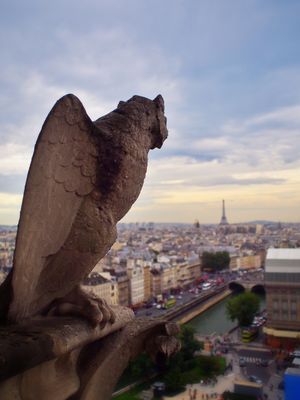 Despite the crowded walkways atop the cathedral, there was this hushed, awed silence. I could hear the wail of breezes over the steep roof and between the stern gargoyles. I could hear the city below and I could see the entirety of Paris splayed as far as I could see. The Eiffel tower looked small but still majestic in the late-evening light, and so did Basilique du Sacré Caeur to the north. The imposing rectangle of La Défense stood among skyscrapers in the far distance. To the south, the white walls and dome of the Pantheon reflected the golden light of the sun. The gargoyles had been witnessing the rise of Paris, from ancient times to modern ones, for hundreds of years. The city below moved forward with time, but up there, I did not feel a part of it. Instead, I was part of something much older, something hallowed, something indescribably beautiful. I could feel God's presence for the first time in a long time. Masya Allah. God is Great.
Despite the crowded walkways atop the cathedral, there was this hushed, awed silence. I could hear the wail of breezes over the steep roof and between the stern gargoyles. I could hear the city below and I could see the entirety of Paris splayed as far as I could see. The Eiffel tower looked small but still majestic in the late-evening light, and so did Basilique du Sacré Caeur to the north. The imposing rectangle of La Défense stood among skyscrapers in the far distance. To the south, the white walls and dome of the Pantheon reflected the golden light of the sun. The gargoyles had been witnessing the rise of Paris, from ancient times to modern ones, for hundreds of years. The city below moved forward with time, but up there, I did not feel a part of it. Instead, I was part of something much older, something hallowed, something indescribably beautiful. I could feel God's presence for the first time in a long time. Masya Allah. God is Great.
For someone who was experiencing an existential crisis, the sudden welcoming presence almost brought me to tears.
So I stood there and existed.
I existed.
Once out of the cathedral, I crossed the bridge back to the 6th arrondissement. By then, my camera battery was almost out, and I was charging the spare one back at the hotel. I made my way back, snapping pictures of fountains and streets, and I also bought a kebab for dinner. 5.50E, but try converting it into ringgit with an exchange rate of 4.41. Almost RM25 for a freaking kebab. It was good, but hey. I went up my room, finished the kebab, changed camera batteries, and then stepped out with no particular direction in mind. I just wanted to walk and breathe in Paris. I went into a comic store to look for graphic novels for Aunty Fa (didn't find them, sorry), and stopped by a pastry shop in Latin Quarter because I could no longer resist the warm scents of bread and chocolate. A cup of hot chocolate and a slice of lemon meringue cake cost me slightly over 10E (yeah. RM45 for a freaking slice of cake!) but it was worth it. My mouth still gets watery thinking about the dessert on the pavement beside a quiet street, and it's already four months since I ate it.
I walked up sloping streets and along old buildings. I stepped into chapel grounds and snapped pictures of busts and flowers. I had no direction, but the Pantheon loomed ever larger, so I used the dome as my compass. It was closed, but bathed in the light of the setting sun, the Pantheon and the Roman buildings around it lit up with a fire of their own. It was breathtaking. And I have pictures to prove it.
The Pantheon was closed for the day, so I walked downhill toward a congregation of trees, which turned out to be the park of Luxembourg palace. Here I finally experienced autumn for the first time. The trees flared red and orange and yellow and green, more often than not all these colors on the same tree. Dry leaves littered the walkways and grass, and the white statues with age stains seemed alive among these brilliant colors. I took in the scents of trees and wet grass, and I watched people cycling, jogging, sitting at the clearing in front of palace grounds and picnicking on the grass. I studied statues after statues. I was doing all I could not to get overwhelmed by it all.
At six, security guards started herding people out of the park, and I snapped more pictures as I made my way out. I had spotted a Metro entrance earlier, so I headed toward it. I wanted to go to the Louvre. Hells yeah.
With the map as my guide, I took the Line B (blue) train to Châtelet-Les-Halles, and then the number 1 (yellow) train to Louvre-Rivoli. I should have stepped out one station farther, Palais-Royal Musée du Louvre, but I didn't know any better. By then, the sun had set and streetlights were on, giving the city a different air, making it even more intriguing. The museum itself was closed, but people still gathered around the glass pyramids, and more than one couple in wedding attire were having outdoor photo sessions.
Louvre. What a sight to behold.
The main pyramid was lit from inside as well as out, and the illumination contrasted brilliantly with the indigo twilight. The centerpiece within the pyramid was a shrouded statue. I could not wait to get inside. I was already thinking about spending at least half a day there. Once I was satisfied with the amount of pictures I took, I strolled further west, along boutiques with expensive wares on display, past hotels with smartly-dressed doormen. Surprisingly, with the distance I had walked, I did not feel tired at all. Not a whit. Maybe it was the comfortable half-boots. Maybe it was the sights. Maybe it was the mild temperature. Maybe it was Paris itself.
Yeah. It definitely was Paris.
I made a stop at L'Obelisque, but I was more interested in the fountains flanking the Egyptian obelisk. Statues of water gods and goddesses glowed green. The details were exquisite, the faces expressive. Using a slow shutter speed was a fruitful endeavor, though I wished I had a tripod or a monopod with me. I made do with the outer basin of the fountains.
I wanted to walk farther up, where Arc de Triomphe stood majestic beyond the heavy traffic going uphill. Yeah, you Parisians are rolling your eyes at me. Crazy guy, planning to walk from Concorde to Arc. The drizzle stopped me. Or saved me, come to think of it. For all its wonders in capturing amazing photos, my E-P5 had no weatherproofing, so braving the rain was definitely not a good idea. I rushed back to the Metro entrance I saw just before the obelisk, and then took the trains back to St-Michel. I took a wrong train or two, of course.
The exhaustion did not overwhelm me until after I took a hot shower back in my hotel room. As I lay on my plush bed editing photos from the day, my eyes became heavier, and I surrendered to sleep.
That night, not only did I dream of Paris, I was also one of the dreamers in Paris.
That night, Paris dreamed of me.
____________________________________________________________________________________________
Photos were taken using the Olympus E-P5, with the 17mm f1.8 lens, and edited on the iPad 3 using the Snapseed app.
January 18, 2014
Book Review: Tropical Madness by Marc de Faoite
Like I do with all storybooks, I approached Tropical Madness with open arms, ready to love it. Besides, I've read Mr de Faoite's stories in other anthologies, and while I notice a certain lack of sense of place, which I will elaborate in a bit, I like his writing. There's an elegance to his prose.
I'll be honest. A gwailo writing about local characters and Asian immigrants? It spells disaster as much as...say...an author who's never been out of Kerala writing a novel about high-society gwailos living it large in New York. I'm not saying it's impossible, especially with Google and Gossip Girl, but it won't feel organic, in part because the author draws on stereotypes. Somehow, however, de Faoite managed to pull it off. There are annoying tics that I'll talk about later, but once I got that de Faoite's writing is not much about the characters as it is about social observations--his social observations, to be exact--I was cool with the book.
However. Maybe my expectation was too high, but I did not get the same feeling I got from his single short stories when I read this book. Mr de Faoite seemed to have overreached too far, bordering on purple prose. He used too many adjectives and adverbs, and his attempts at literary prose were so clumsy that I had to muck through his writing and lost sight of the story. The only stories where the writing didn't get in the way were the Facebook updates, "Where is Ah Girl" and "Ah Girl is in a Relationship". Granted, both stories employ Manglish with all its horrendous grammatical errors, but this is where the writing doesn't stumble as it attempts to do literary acrobatics.
Speaking of, I mentioned before that de Faoite's stories are not about the characters, but about his social observations. "Sang Kancil" is about a Malay husband from an arranged marriage being forced to hunt for a mouse-deer to satisfy his wife's pregnancy-induced cravings. "Under the Shade of the Tamarind Tree" is about the futile attempt of a Hindu community to save their temple, and at the same time touches on the religious double standards in Malaysia. Oh, by the way, the call for Subuh/Fajr prayer doesn't come at sunrise. That's when the prayer time ends. "Siti Fatimah and the Bomoh's Curse" is how a bomoh's curse creates a "Final Destination" effect. No real story line. Just deaths.
Anything that went wrong in the stories, a bomoh, a Malay witchdoctor, was to be blamed. It didn't matter that the story was about a Chinese family ("My Good-Looking Bad-Luck Husband") or an estate Indian community ("The Rubber Tapper's Mangle"). And all the stories in this anthology, except for one ("Milking Pen") uses Kay El for Kuala Lumpur. Local people and Nepalese immigrants do not use the gwailo enunciation of KL. Kampung Malays use Kay El, estate Indians use Kay El, Sitiawan Chinese use Kay El. For the sake of authenticity, the author should have considered Kolumpo, Kuala Lumpur, or simply KL depending on the setting. Not the gwailo Kay El for everything. Maybe it was a stylistic decision, but it still annoyed me.
Another recurring problem with de Faoite's writing is the lack of sense of place. He mentioned Taman Ayer Jingga a lot, and it's a good way to tie the stories together, but Taman Ayer Jingga remained only a name throughout his stories. There are no descriptions of setting, no stage as a backdrop, that the stories are disembodied works that could have happened anywhere, be it Malaysia, Singapore, Indonesia, or Guatemala. The author didn't make full use of the senses to tie down his stories to make them more believable.
He also got lazy toward the middle of the book.
When you sign up for a guided jungle-trail tour, your experience depends on the weather, which is out of the guide's control (ie readers' preference), and the trail the guide uses, be them scenic or bland, as well as the guide's skill in making the trip entertaining and/or educational. Both are within the guide's control (ie an author's skill). If the guide is skilled enough, you get lost in the beauty of the trail, and not the guide's presence. Now, imagine the guide stopping in the middle of a trail and announces, "I'm stopping here. Make your own path. Find your own way out." How does that make you feel? "The Uncles", "All I Want to Do is Play Football", "2064", "Night Fishing", "Trapped in Traffic" and "Milking Pen" are incomplete stories, simply vignettes that have no conclusions or endings. 1/3 of the book. That's quite substantial.
There is one saving grace, however. "The Rubber Tapper's Mangle". It's beautifully written without creating a distraction, and the story itself came to life. There's an honesty in the prose. Honesty and beauty. I'm surprised this story wasn't made the opener for the anthology.
Having read other Fixi Novo books, the writing in this single-author anthology is good in comparison. It would have been much better had de Faoite polished his other stories to a shine that's at least half as bright as "The Rubber Tapper's Mangle". For a native English speaker, I would have expected a richer vocabulary instead of resorting to adverbs. And adverbs. And more adverbs. Why not use "slower" instead of "more slowly"? Why not use "grinned" instead of "smiled broadly"?
I give this anthology 3.5/5 stars, rounded down. It's definitely above average, but not even the beauty of "The Rubber Tapper's Mangle" can elevate the book to a higher rating.
January 3, 2014
Book Review: Aristotle and Dante Discover the Secrets of the Universe
It is the beginning of summer in 1987 and Aristotle Mendoza--Ari, as he calls himself--is a jaded, disillusioned 15-year-old who lives in the shadow of a much older brother who's not even there, who's not even spoken of by his parents. Ari only knows his brother is in prison for something he did when he was Ari's age.
Then he meets Dante Quintana, the boy who teaches Ari how to swim.
Dante is everything Ari is not. He is fair-skinned, much too American to be a Mexican-American in El Paso, outspoken, loves as openly as he is loved, and above all, hates wearing shoes. He loves to read. He loves poetry. He especially loves works by William Carlos Williams. He adores his parents, and they are fierce when it comes to loving and protecting him.
When I woke, Dante was gone.
He hadn't left any of the sketches that he'd done of me. But he did leave a sketch of my rocking chair. It was perfect. A rocking chair against the bare walls of my room. He'd captured the afternoon light streaming into the room, the way the shadows fell on the chair and gave it depth and made it appear as if it was something more than an intimate object. There was something sad and solitary about the sketch and I wondered if that's the way he saw the world or if that's the way he saw my world.
I stared at the sketch for a long time. It scared me. Because there was something true about it.
Ari, on the other hand, loves being alone. He has this anger inside him, and he's constantly afraid that he'll end up like his brother. He longs to connect with his war-haunted father, but at the same time is frustrated by how distant, how disconnected his father is. His mother is the only one who gets him, but he has a sinking feeling she is afraid he will end up like his brother, too.
And then there was this whole thing with my name. Angel Aristotle Mendoza. I hated the name Angel and I'd never let anybody call me that. Every guy I knew who was named Angel was a real asshole. I didn't care for Aristotle either. And even though I knew I was named after my grandfather, I also knew I had inherited the name of the world's most famous philosopher. I hated that. Everyone expected something from me. Something I just couldn't give.
So I renamed myself Ari.
If I switched the letter, my name was Air.
I thought it might be a great thing to be the air.
I could be something and nothing at the same time. I could be necessary and also invisible. Everyone would need me and no one would be able to see me.
In the span of two summers, the boys grow. They grow apart, yet at the same time they grow ever closer. Dante is the only one who gets Ari, even though he knows he may never get Ari. Because Ari doesn't even get himself. He is desperate to get to know his father, to get to know his brother, that he doesn't realize that the person he is searching for is himself.
My father was still there, sitting on my rocking chair.
We studied each other for a moment as I lay in bed.
"You were looking for me," he said.
I looked at him.
"In your dream. You were looking for me."
"I'm always looking for you," I whispered.
I picked this book up at random almost a year ago when I browsed the Young Adult shelves at Kinokuniya. Something about the cover grabbed my attention. In a sense, books are still judged by their covers regardless what people may say. I seldom look for books based on reviews or recommendations. Sometimes I hit rocks and sometimes I hit gold. With this book, however, I hit the mother lode. The Arkenstone, if we want to get all geeky about it.
For that almost-one-year, I've bought the hardcover, four copies of the ebook (1 for myself & 3 for my friends), and an unabridged audiobook. I've read the hardcover three times, read the ebook twice, and listened to the audiobook twice. I've also written to the author to personally thank him for sharing the book with the world, and he's written back.
It's that beautiful.
Benjamin Alire Saenz has a way with words. Since I read Aristotle and Dante Discover the Secrets of the Universe, I bought other books he's published. 1 I bought at Kinokuniya, the rest I had to order online from Amazon. They are all beautifully written, but this book is his best to date. The prose is lyrical, but it is also an effortless read. You don't sense the author's voice. You only hear Ari. And you feel for him. And you want to hug him and tell him that everything will be all right.
Because Ari lives. Dante lives. Their parents live. You want to get to know them more. You want to have dinner with them. You want to protect the boys from the harsh world while they discover the secrets of the universe and change the world with that discovery.
I read novels for pleasure, but with this book.... I want to achieve even half of what Mr Saenz has achieved with his prose. Reading this makes me want to be a better writer. It makes me look out for other books as beautiful as it is, because if one person is able to write something this brilliant, then perhaps there are similar writers, similar books out there.
Forget your aversion toward two boys loving each other. Forget your bigotry, forget your prejudice. Get lost in this book, and fall in love with the boys.
And maybe one day the world will be a beautiful, wonderful place for all children who play by different rules.
December 16, 2013
Book Review: Love in Penang (Fadz Johanabas's Style)
A friend of mine called me out after reading my review of Love in Penang. She said I was being suspiciously vague. Apparently I'm known for being bold & direct (her words), and my review stank of my chickening out.
My first instinct, of course, was to get defensive. After all, I have a story in the anthology, and saying outright which stories suck would be counter-productive. And using "bleugh" is part of my voice, just as I like using "pfft" and fragmented sentences and single word and/or sentence paragraphs. However, one word she said kept ringing in my head as I stood in the shower contemplating a proper reply:
Credibility.
Initially I kept telling myself that no one reads my blog and reviews, anyway, and the only reason I went against my stand to not review local English books again was that I was inspired to share the beauty that is Leroy Luar's "Happiness" with the world. Well that was a long sentence. Anyway, as hot rain-shower eased the tension off my shoulders, I thought about my previous reviews and about how right my friend was. If I was going to review the book, then the least I could do was to commit to my truth, my style, my voice. So here it is, the unadulterated review of the stories that make up Love in Penang.
"Double-Blind" by Zen Cho is about misguided assumptions from gender stereotyping. The use of Manglish is quaint, if somewhat niched, and the story line is quite standard. Read enough QUILTBAG-themed stories and you'll notice certain tropes: us against the world; finding the courage to come out; the queer pining for the straight; discovering and accepting one's own sexuality; mistaken orientation and/or gender assumption; out and proud and looking for love. I may have left a few. Zen's story employs one of the tropes. I like the little well-placed twist at the ending (definitely not a trick ending, which is a major plus), but I don't see the need for the first scene. The story would have been stronger if she had started from the second scene. As for the Manglish, though I don't personally prefer it, I do believe that the author pulled it off quite well.
"Amah's Bicycle" by Julya Oui is a quiet little story about a teenager who takes out her boredom & angst against a rickety old bicycle that has become a permanent fixture outside her grandmother's house, which prompts the grandmother to talk about the past, thus giving the girl a new perspective in her surroundings. It's an anecdotal story, where the scenes move not in front of the reader's eyes, but through the grandmother's storytelling. This means there is no sense of immediacy, but the story is beautifully written nonetheless. The narrator is transformed at the end of the story, so it's a definite plus.
"Happiness" by Leroy Luar is beautiful, pure and simple. As I mentioned before, the prose touches the literary. The story isn't about the narrator, but about his best friend Rachel who's always been haunted by her mother's abandonment when she was four. There is a certain subtlety that you don't realize the change until the story is over and you think about it and then it hits you. To me this should have been the opening story. I am now on the lookout for more works from Leroy Luar.
"Tingles" by Khaliza Khalid is one of the weakest stories in this anthology. There is no sense of place, there is no character depth or development, the plot is weak, and the solutions are immature. Made out of mainly narrative summaries, there is a lack of immediacy & intimacy. The story doesn't move me, doesn't give me tingles.
"When it Rains" by Celine Wu Yee Pheng is among the shorter stories in this anthology. It's a standard boy-meets-girl (in this case, girl-meets-boy), and is baby-platypus-in-a-top-hat cute. The style is simplistic, almost juvenile, but shows potential.
"Yana" by Nadia Khan is one of the few tragic love stories in this anthology. There's something about her writing that grabs you right from the start and keeps you enthralled. Mark my words: Miss Nadia will be one of Malaysian's literary giants of our generation. Her prose is unassuming and candid--in Malay we call it selamba--and you can't help but fall in love with the characters. My only concern is that most of the dialogs are in Penang-Malay, with no supplementary English explanations. While I had fun imitating the dialect, this much bilingualism may alienate readers who have no clue what is being said. However, the story carries its own weight, and I'm quite confident in saying that people will get the story anyway. The story works, dammit. It works.
"Rock 'N' Love" by Gina Yap Lai Yoong is about a man duped into entering the rat race and has to forsake his dream of being a musician. The complications and solutions are convenient--a bit too convenient, in fact--but the prose is clean and the story arc is complete. Standard story.
"Oil on Canvas" by Eeleen Lee is quietly beautiful, as expected of her. It revolves around the identity of a woman in an oil painting, and the love the deceased painter had for her. I was able to guess where the story was leading somewhere in the middle, but the story moved me nonetheless. It's one of the pieces in this anthology that gives it strength and solidity.
"Katak" by William Tham Wai Liang meanders about, and is a bit too generous with adjectives. It's about a guy pining over the memories of an old flame. I think. I kinda lost my concentration halfway through.
"The Baobab Tree" by Shivani Sivagurunathan -- I couldn't finish this story. I tried. I'm trying right now. Maybe one day I'll finish it, but not in the near future.
"Love Letters" by Lean Ka-Min is a fun read. It's about a bookworm who finds a love letter tucked between the pages of a book in the library and decides to trace the addressee. Complication arises and he flails and fails at attempting to save the day. The stakes aren't high, but it's a fun read nonetheless.
"Oh, Snap!" by Mamu Vies touches on corrupt politicians and the measures opposing parties take to defame one another. I can easily see this piece as a screenplay, and it's actually a solid read. Nothing groundbreaking about the plot, but it's entertaining and well-written. Definitely short-film material.
"A Swift Tour" by Kris Williamson can be a tour-of-Penang piece...if the author had any sense of the location in the first place. Where he excelled in describing Kuala Lumpur in his novel, Mr Williamson floundered here and ended up repeating "Penang" so much that it feels like a placeholder, letting readers conjure up their own images of the island-state. And to fit the theme of the anthology, the author also insisted on repeatedly saying how the protagonist loves Penang, because in essence, it's not a love story. The plot is simplistic, but the story could have been saved if actual descriptions of setting are used. Lazy writing, perhaps? However, I like the author's cheeky inclusion of his novel's title in the story. Sorta like finding an Easter egg.
"At the Bridge" by Agnes Ong is about what happens when reality follows happily-ever-afters. It's one of the only pieces that actually describe the setting. Not one of my favorites, but nothing glaring either.
"Runaway" by Dayang Noor is about a woman with commitment issues. Seriously. It's refreshing to know that this affliction is not limited to men. Clean prose, excellent characterization and a complete story arc. What's there to complain? One more pillar to lend this anthology strength. Like Eeleen Lee's works, I think by now I can recognize Dayang Noor's signature voice.
"She, He" by PP is about first loves, forbidden loves. The prose is a bit pretentious and overreaching, but it's not exactly bad, either.
"Majestic Heights" by Marc de Faoite is a beautifully-crafted piece. It's about the potential of love between a Nepalese and an Indonesian, both looking to make a living in a foreign land. I use "foreign land" instead of "Penang" because the setting could have been anywhere: Kuala Lumpur, Johor Bahru, Timbuktu. The story could have been leaps stronger had the author grounded the setting, which is a shame, really, because it is a good story.
"Name" by Fadzlishah Johanabas. Eh. That's me. I'll let you decide if it's good, bad, or blah. I know I wrote it with much love and affection.
So why did I give this anthology 5 stars on Goodreads, when there are weak stories? Stories I hate may be your cup of tea. Stories I swoon over may be blah to you. My actual grade is 4.5, but I rounded it up. There are plenty of pillars in this book that make up for the weaker ones, with -- for me -- "Happiness" being the central support pillar. There is a mixture of voices here that represent Malaysian English (except for barely-legible-English, which you can find on Twitter). The arcs are mostly complete, a rare commodity in Malaysian anthologies, and the contents of this book aren't overwhelmed by political, racial and religious parodies. It shows how Malaysia is moving forward, growing up. It shows grace, and there is much beauty in grace. I hope this book will be read far and wide, and I hope more anthologies of this quality (and more) will be published in the near future.
I am excited by the potential this anthology heralds.
December 15, 2013
Book Review: Love in Penang
Disclaimers:
I mentioned on Twitter that I'd rather not review locally-published English books anymore because of small-minded reaction by small-time author(s). However. This book has that much strength, leave that deep an impression, that I shall write a review anyway.
You may notice my name as one of the contributors, so if you think this is a biased review...eh. Read this review and I'll let you decide.
I have not been kind to books (especially novels) published by Fixi Novo. I expected...more, despite the clearly stated manifesto that Fixi Novo publishes pulp fiction. I still buy every title published, but my level of expection has significantly dropped.
Then Love in Penang comes along.
Where KL Noir series revel in the corrupt, the depraved and the less than savory facets of Kuala Lumpur, Love in Penang is, as its title implies, about love. The anthology isn't about bodice-rippers--come to think of it, why aren't there bodice-rippers? It's less about romance than it is about the romantic. Best of all, the romantic element is (mostly) Malaysian-style. I think this is what I love most about this book. Though written in the American language, not a single story in this anthology attempts to to emulate American sensibilities.
First, you'll notice how varied the "American language" is employed, from half the story (and most of the dialogs) unapologetically written in Penang-Malay (Nadia Khan's "Yana"), to Manglish with its lahs and hors and fragmented sentences (Zen Cho's "Double-Blind") to formal English with Malaysian sensibilities (my story "Name" is among them), and to prose that touches the literary (Leroy Luar's "Happiness" and Marc de Faoite's "Majestic Heights").
Perhaps stories like "Yana" will alienate readers who do not understand Malay, much less Penang-Malay, but will tickle the fancy of local readers who will read the story with much familiarity and vocalize the dialogs with a pseudo-Penang twang. Perhaps stories like "Double-Blind" will have actual American readers go, "Oh, how quaint. These third-worlders can speak and write a semblance of understandable English, and not live in trees as we've expected." Perhaps they are the most at risk to be set into a certain niche labeled "Malaysian English". Perhaps local readers will have difficulty accepting stories written in proper English, saying, "Konon Mat Salleh sangat la tu. Perasan." Let me tell you that it doesn't matter, because almost the entire spectrum of Malaysian English can be found within this anthology.
Then you'll notice the recurring locations. Eastern & Oriental Hotel is mentioned in 3 stories, the Esplanade in 2, Chowrasta Market in 2, Hard Rock Cafe in 2, Penang Bridge in...hmm...it's featured in 1 story (Agnes Ong's "At the Bridge") but mentioned in passing in several other stories. Funnily enough, Komtar is only mentioned in 1 story, and Bukit Bendera is not used as a setting. I wish there were a more defined sense of setting instead of simply mentioning these places. Take the E&O for example. I'm sure it is used because of its fame & history, but these stories don't describe the actual building. Kris Williamson's "A Swift Tour" does, actually, but if only there were..more.
A lot of the characters are also Hokkien Chinese (plus a Nepalese & an Indonesian protagonists in Marc de Faoite's "Majestic Heights"), and a recurring name is Hui Lin, Hui Ling, and Ling. Purely coincidental, mind.
And then there's the food. We're in Malaysia, and food is a major part of our culture. Perhaps this element could have been employed more, as certain foods are aphrodisiac, and a person's love for food will surely fit the general theme of the book, but this is just me being anal.
Because honest to God, this book is awesome. I am most concerned about a complete story arc (beginning, middle and end, though not necessarily in that particular order), and what's frustrating about Malaysian writing is that writers like to act "smart" and meander the whole length of the story, then abruptly end using totally new and unrelated elements in an open-ended conclusion that concludes nothing. Often, deus ex machina is used, and I hate that the most. Except for 1 or 2 stories (that shall remain nameless), stories in this anthology respect readers, and for that, I wholeheartedly respect the editor, Ms Anna Tan.
If you only have time to read one story, I highly recommend that you read Leroy Luar's "Happiness". The prose is brilliant, and every sentence moves the story forward. The story is quietly beautiful. It's a wonder I've never read his work(s) before. It's also a wonder why this story wasn't made the opener for the anthology. It's that strong.
There are also stories that touch on corrupt politicians and equally dubious political parties, namely Mamu Vies's "Oh, Snap!", but I'd be surprised if there are no stories at all that do this. Literature, and Art in general, reflect the time if its conception, and our political scene, with its toddler-tamper-tantrums, is a part of our culture, our life. I'm just thankful it doesn't overpower the theme of the anthology, as it does in other anthologies & long-forms.
This book is not perfect. I never claimed it was. One novelist keeps repeating "Penang" in his story, taking up the most "Penang" word count. Because, you know, if Penang is not mentioned enough for a story based in Penang, people won't know it's in Penang, because it is in Penang, you know? Because the anthology is Love in Penang, you readers have to know the story's in Penang. Again. It's in Penang.
Yeah. When an author is not familiar with a setting, generalize it enough, sprinkle the name of the location enough times that readers will get distracted & don't realize you don't actually know what you're talking about. However, I do give him props for subtly (or not so subtly) promoting the title of his novel. Brilliant.
Another novelist's short story in here is as equally messy as the novel. Poor characterization, immature plotline & measures to move the story forward, and overall it's just...messy. Bleugh.
1 story I couldn't not finish because it meandered too much that it got boring.
Others? They give this anthology strength and dignity. They give me a sense of excitement that Malaysian-English literature is leaping out of its sandbox & into international playing fields. They make me say, "this book should seriously be considered for serious awards." They are beautiful, they are tragic, they are well-written and well-chosen.
And then there is my story that closes the book. Well, that's for you to decide if you like it or not.
Technical-wise, the anthology is well-edited & well-formatted. I have qualms about the improper use of colons and semi-colons, but that's also me being anal.
All in all, I salute Anna Tan for compiling an excellent book, and I believe my hope in Fixi Novo is restored. May more volumes of this caliber be published and read worldwide. This book deserves 4.5 stars out of 5.
December 14, 2013
Godspeed, Kiddo
My kid brother is leaving the family.
I know he sometimes wishes he can actually leave the family, but this is not happening in the forseeable future. Not if I can help it. Come to think of it, Kasha will kill him first before she allows this to happen. No. My kid brother is leaving us to chase his dreams.
His American dreams.
We have been polar opposites for as long as I can remember. He is an extrovert, while I am a well-adjusted introvert. He hates studying, whereas I--wait, I hate studying too. I just love reading. He has a natural charm, and he gathers and keeps friends whom he considers family, whereas I have only my family. I do not make friends easily, and I'm even worse at keeping them. He is in love with his soulmate, whereas I am only in love with the idea of a soulmate, but shudder at the thought of sharing my life with someone, anyone.
My brother lives his life, while I...I sit back, observe, and write about it.
Back in school, he used to complain that I cast a looming shadow and teachers compared the both of us and expected him to follow my footsteps. In his typical fashion, he sidestepped and stood in his own light. In truth, I have always hidden in my siblings' shadows, a place most comfortable and secure. I used to always be "Lisha's little brother" in school, and I am now "Kude/Kudegraphy's brother" and "Mo". Of course, I also don't have a clue how to be under the radar, but it's always good to know that I have a place to go to whenever the world gets too much, too crowded for me.
Only now, half of my safety-shadow will be half a world away.
I have voiced my concern, that my brother and his soulmate Ili have made a significant name in the local wedding photography scene as Kudegraphy, and when they move to the United States of America, they'll have to start fresh, and they will not have the safety net that they are used to here. At the same time, I have also voiced my sincere admiration for their bravery.
They are out there, doing what they love best.
They are out there, chasing their dreams.
They are out there, living life.
We've always had our differences, and I keep yelling at him to be more responsible, to carry his weight in taking care of our family, and he keeps yelling back. The one thing he said that I'll carry forever is, "You don't have a life, Abang." It'll stay because what he said is absolutely true. I used to only live for my family, but after the accident, I don't even know what I'm living for. Day-to-day survival? One breath at a time? I don't know. I used to not have a life, and now I'm not even living.
So yes. I am a little envious at my kid brother for grabbing life by the balls while I cling to a fraying tether. More than that, however, I want him to push himself further, because he can go so much farther, spread his wings so much wider. It's enough that Kasha and I are bogged down by our responsibilities; one of the three of us should taste the best life has to offer, so that the other two can live through him vicariously.
My kid brother Faiz, known to the world as Kude, will venture out into the unknown, without the safety net of family to cushion him and Ili, and as much fear I have for their well-being, I eclipse that with hope that they will make it big no matter where they land.
So I implore you, dear friends, regardless which deity you pray to, to pray for Kude's and Ili's safety, happiness and prosperity. I'm sure the Almighty will take your well wishes into consideration and envelop these two with His grace.
I love you, Kiddo. Godspeed.
September 29, 2013
Germany: learning the train routes
September 29, 2013
Cattles, I tell you.
"Where are you going?" he says.
"Mainz," I say. (Main-z)
He quirks an eyebrow. "What are you doing in MAI-NZ?"
Oops. "Conference."
"How long?"
"Flying back on the 6th."
He flicks my passport back toward me. Not even a smile. Sheesh.
Anyway, the first thing I do upon officiallty reaching Germany is take a long, satisfying leak. Been drinking too much in-flight -- and yes, I did use the toilet somewhere over Ukraine. Then, after retrieving our bags, Mr Azmi leads the way. He spent almost a year in Germany 8 years ago. I'm already in 3 layers of clothes: a thin T-shirt, a form-fitting sweater, and a jacket. Because of this, I don't really feel the cold when we exit the airport to wait for a shuttle to Terminal 1. But. BREATH-SMOKES! It's just after sunrise, and 10C, and the air is crisp and fresh and absolutely awesome.
For EU4.90 each, we take the regional train to Mainz. The coaches are almost empty, and as the train speeds along its track, Mr Azmi regales us with stories of his time here. We pass empty fields dotted with cylindrical bales, houses with uniformly tall slate roofs, and the collection of Opel complexes (Opel has its own train station--that's how big it is). We reach Mainz southwest of the river Rhine after slightly over 30 minutes. The buildings look architecturally old (I eventually learn that Mainz is over 2000 years old) and here and there are ruins of the Roman Empire. At first glance, it looks like a quaint township. Also, crisp winds blow from everywhere and I finally feel the cold.
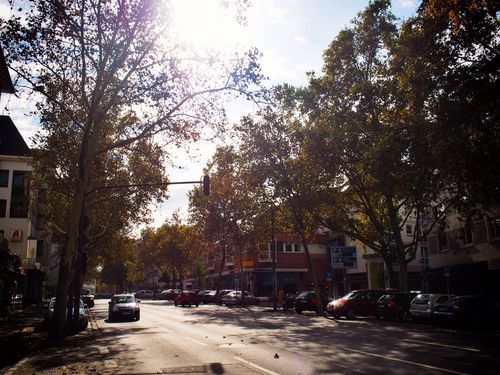
I come from a land where the sun is still deep within the bones of buildings even though it is already half a world away, so 10C is COLD. Heh.One of the first things I notice, other than the warm scents of fresh pastries, is the amount of broken bottles that littered the pavements, and a certain sense of...emptiness. Granted, it's only 9 on a Sunday morning. I can't help but compare the Mainz I see with Fremantle, Australia, though in truth, it's so much bigger. Buses and trams stop in front of the train station, but since everything is in German, and we don't really know where our hotels are, Mr Azmi asks if we should just walk.
Hells, yeah.Turns out, I'm well-prepared for travel. Seeing that every 20MB of internet bandwidth costs RM48, my data roaming is off. However, I have installed an offline GPS-based city map app, CityMaps2Go several months ago, and Word Lens, an app that translates texts in other languages into English (I know, right?) when I hover the phone-camera over them. Word Lens was installed over a year ago, but I recently purchased German & French translations. Anyway, we part ways as my hotel is way farther down the road.
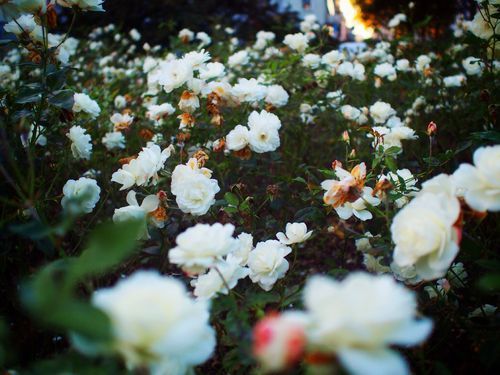
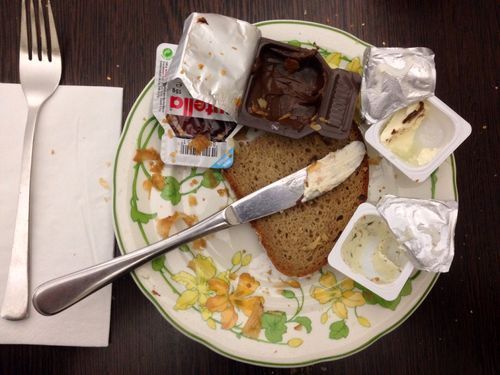 Breakfast spread consists of cereal, museli, huge bowls of fresh yoghurt, cuts of unidentifiable meat, breads and croissants, fruits, and several choices of hot brew and juices. I go for the safest bet, which is yoghurt dumped with mixed fruits, bread, croissants with Nutella, and juice. No tastebud explosion, but breakfast is still good. Then, having so many hours to kill, I decide to explore Frankfurt. The receptionist lets me keep my luggage in their conference room, so I just carry the Crumpler backpack I borrowed from Kasha. It's still heavy, mind, with all the camera gear and other junks I've shoved inside.
Breakfast spread consists of cereal, museli, huge bowls of fresh yoghurt, cuts of unidentifiable meat, breads and croissants, fruits, and several choices of hot brew and juices. I go for the safest bet, which is yoghurt dumped with mixed fruits, bread, croissants with Nutella, and juice. No tastebud explosion, but breakfast is still good. Then, having so many hours to kill, I decide to explore Frankfurt. The receptionist lets me keep my luggage in their conference room, so I just carry the Crumpler backpack I borrowed from Kasha. It's still heavy, mind, with all the camera gear and other junks I've shoved inside.
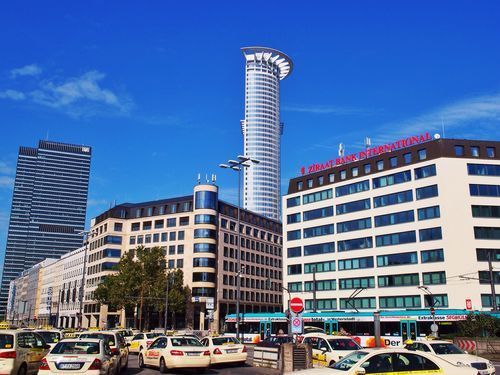
It's almost eleven and Frankfurt reminds me of Perth in winter. The temperature is still cool (15C) but not that bad, but hey, I'm in 3 layers of clothes. The sky is a crisp blue, with minimal clouds. However, Frankfurt also feels entirely different from Perth, because the vibe of a huge city still there. People walk fast, and cars and taxis are everywhere.
I check my map, not knowing where to go, but it's not that helpful. Fine, I still don't quite know how to use it.
Sheesh.
So what do I do? I walk a straight path from the station. And I just walk. And I snap photos. Surprisingly, the shops are all closed, leaving only restaurants and cafes open. Yeah, I kinda didn't know that in Germany, shops and malls are closed on Sundays (still not sure about public holidays). Like, what gives, right? Anyway, no chance to shop means more chance to not spend, which is always good. One of the malls has an observation deck on the 7th floor, so I make my way up, fist-bumping with a short German guy (my height) who has a bottle of whiskey in one hand.
"Garble garble garble Mr Jack Daniels garble garble," he says.
I nod. I assume he's praising the alcohol brand. We fist-bump again.
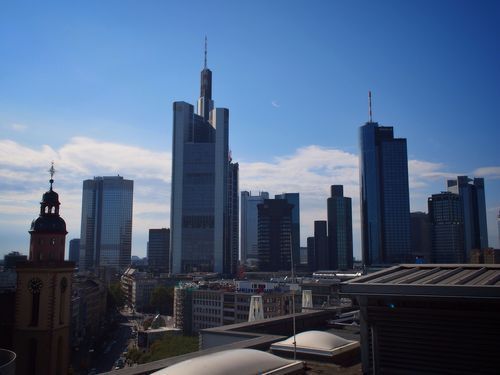
A city is a city is a city, right? Not quite. I've had the pleasure of getting a bird's-eye view of Kuala Lumpur, Johor Bahru, Penang, Bangkok, Jakarta, Perth and...oh, what the hey, Kota Bharu and Kota Kinabalu as well. Each city has its own character. Frankfurt has modern skyscrapers interspersed with huge cathedrals, and lined with railway tracks. The river Rhine runs along the city, and bridges of various sizes and shapes connect both banks.
Still. 7th floor is not high enough. I need to go higher. I activate data roaming long enough to check the the location of Main Tower (see the half-cylindrical building with the red-and-white rod sticking out? That's the tower). I wince as WhatsApp and email notifications come flooding in. THAT'S PRECIOUS BANDWIDTH, DAMNIT!
I take off my jacket as it's getting slightly warmer. Or, maybe my body has warmed up from all the walking. Before heading for the tower, I check out the mall next to the one I'm at, and I'm glad for the decision. Part of the glass roof is a funnel that arches up and widens toward one end.
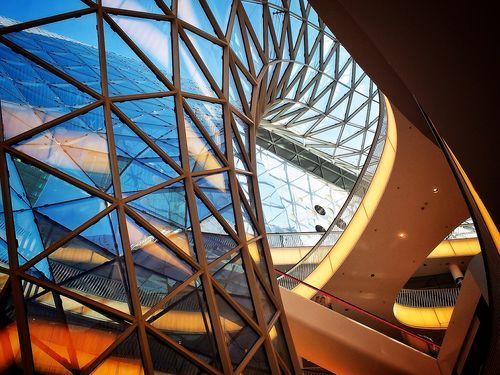
The light that bathes the mall because of this is simply amazing. More inspired photos. Would have been better if the shops were open, but no matter.
I walk toward the general direction of the tower, craning my neck to make sure it's still within sight, and pass by a row of upscale brand stores. THANK GOD THEY'RE CLOSED! Further down the road, beyond a bend, is the entrance to the tower. EU8 to the observation deck.
Notice how I'm listing the price here? I almost never think about the cost of things, but with a 4.41 exchange rate where my RM5k is equivalent to EU1.3k, my expenditure counts! I even end up making a list on Evernote.
Moving on.
The view from the 55th floor is even more breathtaking, which causes my lungs to burn slightly because of the cold, crisp air.
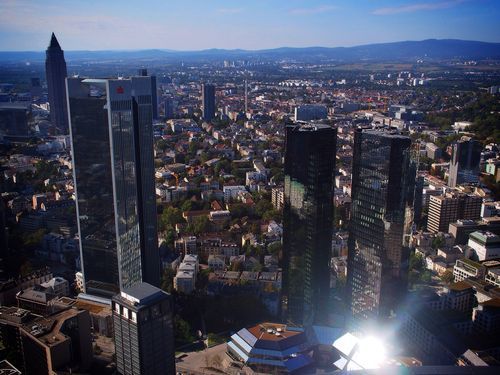

Remember the train tracks and Rhine with its bridges I mentioned? There you go. You're welcome. I think it's over half-an-hour before I decide to come back down. Between snapping pictures, I just stand there, breathing in the fresh air, listening to people chatter in a language that's alien to me, and like I always do whenever I get to witness something this beautiful, I just...exist.
Masya-Allah. By the grace of Allah, I simply exist.
You see, for someone who's having an existential crisis, I get choked up by this reminder. It gladdens my heart that such beautiful things exist, and it saddens me knowing that there is so much more I haven't experienced, that there is so much more I will never get to experience.
So, for now, a little closer to the heavens, surrounded by strangers, I exist.
Then, after finally coming down back to the ground, I walk. My ultimate goal is the train station, but I'm not in a hurry. I cannot consider myself lost when I don't have a destination, so there is no fear, no agitation.
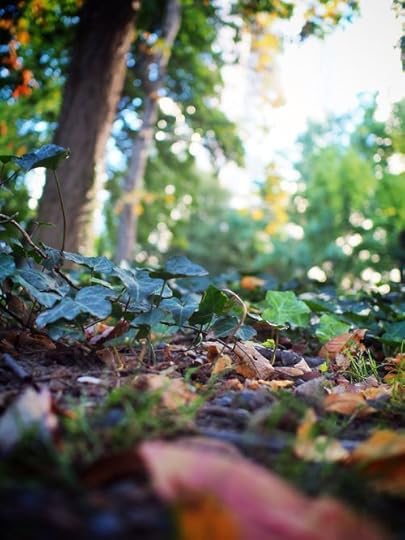
I walk along a path that cuts through a park dotted with sculptures. People are lying on the tall grass, in the sun. I mean, I'm so used to avoiding the sun that seeing this still fills me with wonder. I end up walking to the Alter Oper (opera house), where this lone guy is playing violin for an appreciative crowd. I snap a picture of him, but he turns away, so I just shrug and drop a EU1 coin into his collection box.
He calls me back to snap a proper picture of him playing. "Now you can take photo," he says, still playing the violin.
Heh.
Somehow I make it back to the train station. Well, the GPS-activated map helps. I hop on a train back to Mainz, not knowing that it's Mainz-Kessel, which is on the wrong side of the riverbank from my destination, Mainz Hbf. Good thing I have a day-ticket, huh?
I consider it a small blessing, because not only do I manage to learn the train schedules and platforms, but I also get to find wonderful gifts for Arwen.
One down, seven more family members to go.
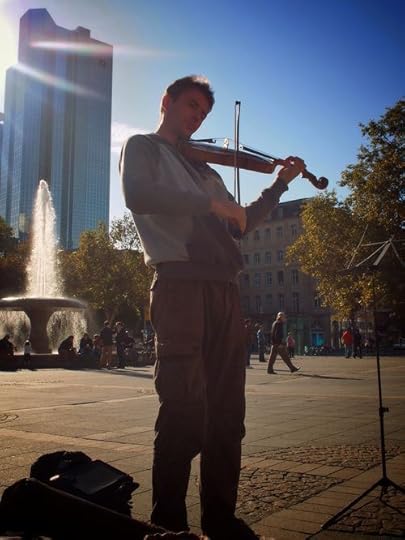
Once I reach Mainz (the correct station this time), I walk back to the hotel, get in my room to shower and pray, and transfer-and-edit the photos I've taken.
Then I make my way back to Frankfurt.
Yes, I do.
September 28, 2013
Germany: the story begins
September 29, 2013
It is 09:52 in the morning in Kuala Lumpur, but it is only 03:52 in Germany. We are 10 hours into the flight, with slightly over 2 more hours to go. I am currently over Ukraine, and outside the window, the world is still dark. A steady light illuminates the wingtip, but not enough to light up the world. I can see patches of concentrated lights, patches of civilization spread across the land. Above, equally dark, is a sea of stars. Up here, where there is no light pollution, I can easily make out the pattern that makes up Ursa Major. I cannot see Polaris, the North Star, but I know it is out there somewhere.
There is a band just beyond the Eastern horizon. If you paint a swath of black using watercolor, and then swipe a line of white paint-tinged water, you will seee a band of lightness slowly spreading. That is what I am seeing right at this moment. We are traveling away from the sun, but even at over 800kmph, we cannot outrun it.
I look out the window again, and I imagine that the people who occupy the small patches of light must be sleeping right now. It is not yet time to wake up, to face what the coming day has to offer. I wonder how these people look like, almost a quarter world away from home. I wonder what my family and loved ones are doing at home. Are they still sleeping, as it is a lazy Sunday?
Most of the passengers in this flight are sleeping. There are those who are walking about, stretching their legs. There are those who are watching movies on their personal screens. And there are those like me, chronicling their first solo Europe trip.
I wish you could be here with me. I wish you could see the dark world with patches of light on the land and in the sky, with the promise of sunrise just beyond the horizon.
I know this is a poor substitute, but it would be great if we could be connected through time and space through these entries.
 Posted with Blogsy
Posted with Blogsy

